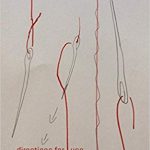This summer, the Loyola Libraries are excited to bring you the World Cup of Books, an interactive program to encouraging reading books from other countries. Show your support for your favorite team by reading books from and about their country!
Today’s match-ups include Serbia v Brazil, Switzerland v Costa Rica, Korea Republic v Germany, and Mexico v Sweden
Serbia:
Directions for Use: Selected Poems by Ana Ristović, translated by Steven Teref and Maja Teref 
Ana Ristovic’s erotic, wry, feminist poems concern daily routines (washing laundry, doing crossword puzzles). In her writing she explores inner and outer worlds, sex, and relationships. This bilingual (Serbian and English) selection unveils a rich embroidery of frank sexuality and lyric images. -Amazon
Request it here or grab it from the Lewis Display
Brazil:
Zero by Ignacio de Loyola Brandão, translated by Ellen Watson
Against a backdrop of political corruption Jose lives an ordinary life, working a dead-end job catching mice in a dingy movie theater. Everything changes when he meets his wife Rosa thanks to the help of the Happy Heart Marriage Agency. [Rosa] just wants a house. Jose sets out to get the money necessary to make that possible. And in doing so, he manages to become a robber, sniper, and political subversive wanted by the government. Deploying fast-paced, short chapters in a number of styles, Brandao deftly presents an array of engaging characters and conflicts, vividly depicting the absurdity of a repressive political regime with exceptional daring and humor. -Amazon
Request it here or grab it from the Cudahy Main Stacks
Switzerland:
Comedies by Robert Walser, translated by Daniele Pantano and James Reidel 
The short plays presented here, inspired by the German theater Walser enjoyed in his youth, while never meant to be performed, present scenes, characters, and situations that comment on the brutality of fairy tales, the impossibilities of love, the dark fate of the Christ child (and Walser himself), and more. At the same time, like all of Walser’s work they are shot through with a humor that is wholly genuine despite its shades of darkness. –University of Chicago Press
Request it here or grab it from the IC Display
Costa Rica:
Coral Tree: a Costa Rican canon by Jennifer C. Weil
Coral Tree: A Costa Rican Canon is a work of short stories and poetry inspired by a country much larger than its territory. These pieces of life arose almost unbidden, such was and continues to be the alchemical effect of this tiny nation. This book is a vacation that begs you to hold it in your hands and let it find its way into your spirit. -Amazon
Request it here or grab it from the Cudahy Main Stacks
Korea Republic:
I hear your voice by Young-ha Kim, translated by Krys Lee 
A pair of alienated, hypersensitive South Korean boys seek solace, first from each other and then from the volatile subculture of their homeless, aimless peers. It would be difficult to imagine two more marginalized protagonists than Jae and Donggyu. Jae, born in Seoul’s Express Bus Terminal to a homeless teenager, is destined from the start to repeat his mother’s fate. A few years later, Jae, who’s been adopted by a “hostess club” kitchen employee, meets Donggyu, the son of a police detective, and they forge a lifelong bond. Jae is the only person who can communicate with Donggyu, who for years will not say a word to anyone. Jae’s ability to be “the interpreter” of Donggyu’s desires foretells psychic gifts that help him not only survive, but prevail when he’s compelled to forage through the city’s meaner streets of criminals, prostitutes, and teen runaways. [Kim’s] empathetic gifts applied toward even the quirkiest and seediest of his characters evoke a vivid panorama of what life along the edges is like in Seoul. –Kirkus Review
Request it here or grab it from the IC Display
Germany:
Eichmann’s Executioner: a novel by Astrid Dehe and Achim Engstler, translated by Helen MacCormac and Alyson Coombes
A gripping and beautifully imagined work of literary fiction that explores history and memory and the traumatic legacy of the Holocaust. In May 1962, twenty-two men gathered in Jerusalem to decide by lot who would be Eichmann’s executioner. These men had guarded the former Nazi SS lieutenant colonel during his imprisonment and trial, and in the absence of trained executioners in Israel it would fall to one of them to end Eichmann’s life. Shalom Nagar, the only one among them who had asked not to participate, drew the short straw. In a novel that picks up decades later, Nagar is living on the outskirts of Tel Aviv, haunted by his memory of Eichmann. Astrid Dehe and Achim Engstler raise provocative and universal questions of how we represent the past, whether we should, and how these representations impinge upon the present. –The New Press
Request it here or grab it from the IC Display
Mexico:
The story of my teeth by Valeria Luiselli, translated by Christina MacSweeney 
A lively, loopy experimental novel rich with musings on language, art, and, yes, teeth. Each section of the second novel opens with an epigram about the disconnect between the signifier and signified. If you dozed off during lectures on semiotics in college, fear not: though the author is interested in the slippery nature of description, this novel’s style and tone are brisk and jargon-free. The narrator, Gustavo, has decided late in life to become an auctioneer, a job he thrives at in part by skillfully overhyping the values of the objects on offer. The skeletal plot focuses on Gustavo’s hosting an auction to benefit a church outside Mexico City, his hoard of prized objects, and his reunion with his son. But the book lives in its offbeat digressions, like an extended discussion of literary eminences’ lives via their teeth. A clever philosophical novel that, as the author puts it, has “less to do with lying than surpassing the truth.” –Kirkus Review
Request it here or grab it from the Cudahy Main Stacks
Sweden:
The dying game: a novel by Asa Avdic, translated by Rachel Willson-Broyles
In the not-too-distant future, a group of carefully chosen people spends 48 hours on a remote Swedish island engaged in what at first seems like an exercise but turns into a high-stakes test of survival and betrayal. It’s 2037, and the world is shockingly different yet terrifyingly the same: there’s been another Cold War, and, at least in the Protectorate of Sweden, loyalty to the all-powerful government is paramount. As if Agatha Christie’s And Then There Were None was cross-pollinated with “The Most Dangerous Game,” Anna is charged with observing a small group of hand-selected Swedes for two days on the island of Isola; that is, until she’s meant to fake her own murder and disappear into the walls of the compound to watch how the others respond to the “crime.” –Kirkus Review
Request it here or grab it from the IC Display
Have you read any of these books, or a book from another country participating in the 2018 World Cup? Add a review of a book from a participating nation to our bracket here! You can also fill out our quick form here, and we’ll add your review to the bracket board. Your review may appear in a future blog post!

